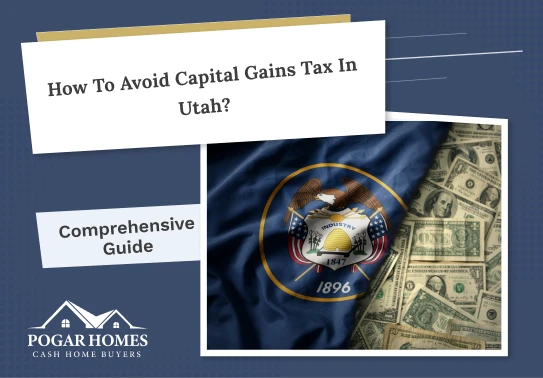
If you generate a good profit by selling a real estate home or investment, a certain amount of tax, capital gains tax, is applied to this profit. Capital gains tax in Utah is a sensitive topic, and a clear understanding of this subject is critical. It will help you to know more about your business and investment and propose an effective solution to reduce or avoid these taxes. Executing this daunting challenge alone can be time-consuming and sometimes ends up at risk. Therefore, it is necessary to consult an expert realtor to narrow down the objective of reducing these tax rates.
Capital gains tax Utah is the amount of profit you obtain from selling assets whose financial worth has increased over time. This asset could be anything, such as your car, house, online trading, or inherited property, that can be impacted by the influence of time. You can evaluate this tax by subtracting the value of your asset’s price from the total finalized cost. This tax applies to sold capital gains and generates significant income. The Internal Revenue Service of Utah implements this tax. On the other hand, if you have an asset such as stocks or real estate property that has not been sold yet but has gained financial worth over time, the rate will not be applied to it. This tax is only applicable to those capital gains that have been sold and generated income from them.
Short-term tax is the kind of capital gain in which you generate profit from assets like personal, investment, or capital is reserved for a year or less. For instance, if you have had a capital gain in recent times and the profit obtained after selling it, you will tax at the higher right. The Internal Revenue Service of Utah will charge you this tax in the same way as your income if you fall in this tax bracket. This tax rate ranges from 10% to 37%, depending on your filing status.
Long-term capital gains apply to the income of assets secured for over a year. According to the Department of Internal Revenue Service, the Utah capital gains tax for people in this tax bracket is less than the short-term capital gains tax. Therefore, we recommend that you hold your assets for a more extended period to avoid or reduce this tax. However, this tax rate ranges from 0% to 20%, depending on the income generated.
Utah’s capital gains tax rate is influenced by certain critical parameters. These include your income and filing status, period as holder (1 year or more), your residence position (primary or secondary), and your personal condition (single or married). In Utah, the tax rate is applicable without any discrimination compared to the Federal government. This means if you are in the tax bracket of short-term capital gains, long-term capital gains, or simply a salaried person, you will tax at the fixed rate of 4.85%.
If you are an excessive taxpayer, consider the following tips and tricks. They will help to prevent or at least minimize the impact of Utah capital gains tax.
But it is important to know that you usually cannot avoid taxes on the profit from selling houses or dealing with investments if you sell more than one within two years.
Understanding the capital gains tax and its impact is essential to saving thousands of dollars and cutting off your profits. One of the best techniques is to consult Pogar Home Buyers to grab sound information about capital gains tax in Utah. They get a thorough overview of your businesses and investments and make policies to avoid them as per Utah’s state law. They assist in selling your house without stress and provide a deep insight into this challenging topic. Also, they have a legal team to guide you about each ongoing step to help you avoid capital gains tax. Ready to contact them to avoid this daunting tax draining your income?
Learning and comprehending the essential parameters of Utah’s capital gains tax is critical. This helps you make intelligent decisions when closing a real estate business or other investment. On the other hand, it can drain your income generated from closing the sale of property or investment retained for over a year. Executing this task alone can be a hassle and put your assets at risk if not applied smartly. Therefore, consulting an expert realtor and legal advisor is crucial to avoid capital gains tax in Utah. These experts use straightforward techniques, such as donations and investing income in retirement accounts, to decline or evade capital gains tax in Utah.
In Utah, the tax rates are the same for all business people and investors. This means if you are in the tax bracket of short-term capital gains, long-term capital gains, or simply a salaried person, you will be taxed at the fixed rate of 4.85%.
Pogar Home Buyers has a team of professional real estate experts and legal attorneys who can provide guidance to avoid capital gains tax. They offer professional assistance to streamline the selling process and navigate capital gains tax efficiently.
When choosing Pogar Home Buyers, you will receive expert guidance. They have an expert realtor team to navigate the complexities of capital gains tax to save you money and increase your profits.
In the US, each state has a different tax rate for distinct tax brackets. Certain states, such as Alaska, Nevada, Texas, Washington, and Florida, subsidize their people's capital gains tax. However, in Utah, the capital gains tax is the same (4.85%) for everyone in these brackets.